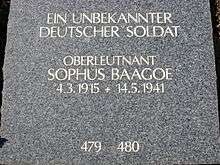Sophus Baagoe
| Sophus Baagoe | |
|---|---|
| Born |
4 March 1915 Flensburg |
| Died |
14 May 1941 (aged 26) Heraklion |
| Buried at |
German War Cemetery Maleme (Block 1-grave 480) |
| Allegiance |
|
| Service/branch |
|
| Years of service | ?–1941 |
| Rank | Oberleutnant |
| Unit | ZG 26 |
| Battles/wars | |
| Awards | Knight's Cross of the Iron Cross |
Sophus Baagoe (4 March 1915 – 14 May 1941) was a German Luftwaffe ace and recipient of the Knight's Cross of the Iron Cross (German: Ritterkreuz des Eisernen Kreuzes) during World War II. The Knight's Cross of the Iron Cross was awarded to recognise extreme battlefield bravery or successful military leadership. Baagoe claimed 14 aerial victories, 13 over the Western Front and 1 over the Mediterranean Front. He is one of the two pilots credited with the kill of the RAF top ace Pat Marmaduke Pattle, on 20 April 1941, in Greece, with Theodor Rossiwall.[1]
Career

Sophus Baagoe was a member of the Luftwaffe at the beginning of the war and participated in the Battle of France, where he claimed his first four victories. As a member of Zerstörergeschwader 26 "Horst Wessel" (ZG 26—26th Destroyer Wing) he exclusively flew the Messerschmitt Bf 110, twin engine heavy fighter. He scored 9 more during the Battle of Britain against the Royal Air Force (RAF), bring his total to 13 and his final victory was during the Battle of Greece. He and his aerial gunner, Oberfeldwebel Becker, were killed 14 May 1941 during the Battle of Crete. There is some dispute over how he died; he was either killed by anti-aircraft fire from the ground or by RAF pilots. He may have been shot down by the New Zealand Gladiator pilot D.F. Westenra of No. 112 Squadron RAF. Baagoe was posthumously awarded the Knight's Cross of the Iron Cross (Ritterkreuz des Eisernen Kreuzes) on 14 June 1941.
Awards
- Front Flying Clasp of the Luftwaffe
- Iron Cross (1939)
- Knight's Cross of the Iron Cross on 14 June 1941 as Oberleutnant and pilot in the 5./Zerstörergeschwader 26 "Horst Wessel"[3]
References
Citations
Bibliography
- Fellgiebel, Walther-Peer (2000) [1986]. Die Träger des Ritterkreuzes des Eisernen Kreuzes 1939–1945 — Die Inhaber der höchsten Auszeichnung des Zweiten Weltkrieges aller Wehrmachtteile [The Bearers of the Knight's Cross of the Iron Cross 1939–1945 — The Owners of the Highest Award of the Second World War of all Wehrmacht Branches] (in German). Friedberg, Germany: Podzun-Pallas. ISBN 978-3-7909-0284-6.
- Huß, Jürgen; Viohl, Armin (2003). Die Ritterkreuzträger des Eisernen Kreuzes der preußischen Provinz Schleswig-Holstein und der Freien und Hansestadt Lübeck 1939–1945 [The Knight's Cross Bearers the Prussian Province of Schleswig-Holstein and the Free and Hanseatic City of Lübeck 1939–1945] (in German). Zweibrücken, Germany: VDM Heinz Nickel. ISBN 978-3-925480-79-9.
- Obermaier, Ernst (1989). Die Ritterkreuzträger der Luftwaffe Jagdflieger 1939 – 1945 [The Knight's Cross Bearers of the Luftwaffe Fighter Force 1939 – 1945] (in German). Mainz, Germany: Verlag Dieter Hoffmann. ISBN 978-3-87341-065-7.
- Scherzer, Veit (2007). Die Ritterkreuzträger 1939–1945 Die Inhaber des Ritterkreuzes des Eisernen Kreuzes 1939 von Heer, Luftwaffe, Kriegsmarine, Waffen-SS, Volkssturm sowie mit Deutschland verbündeter Streitkräfte nach den Unterlagen des Bundesarchives [The Knight's Cross Bearers 1939–1945 The Holders of the Knight's Cross of the Iron Cross 1939 by Army, Air Force, Navy, Waffen-SS, Volkssturm and Allied Forces with Germany According to the Documents of the Federal Archives] (in German). Jena, Germany: Scherzers Miltaer-Verlag. ISBN 978-3-938845-17-2.
- Weal, John (2012). Messerschmitt Bf 110 Zerstörer Aces of World War 2. Osprey Publishing. ISBN 978-1-78200-527-8.
External links
| ||||||||||